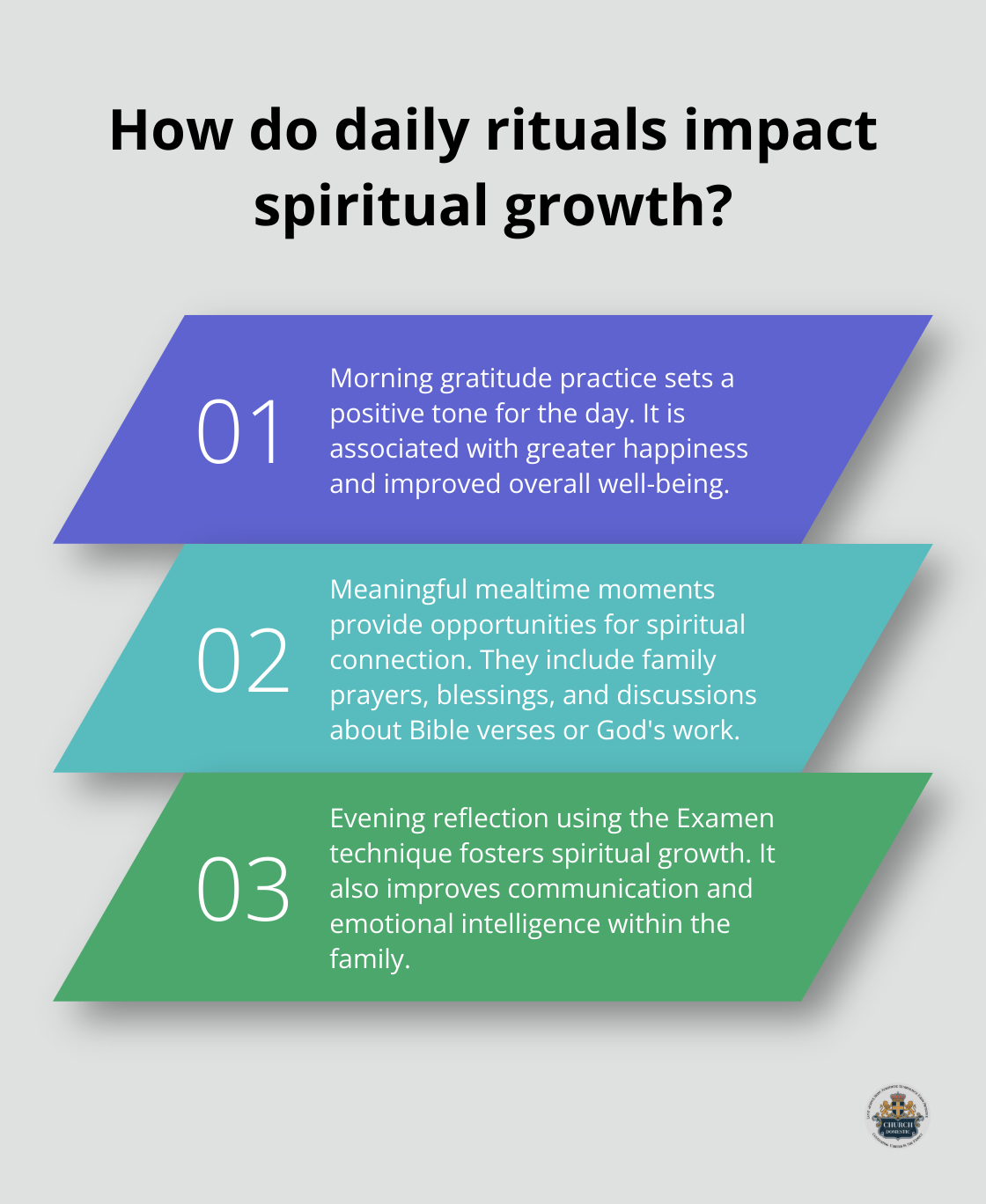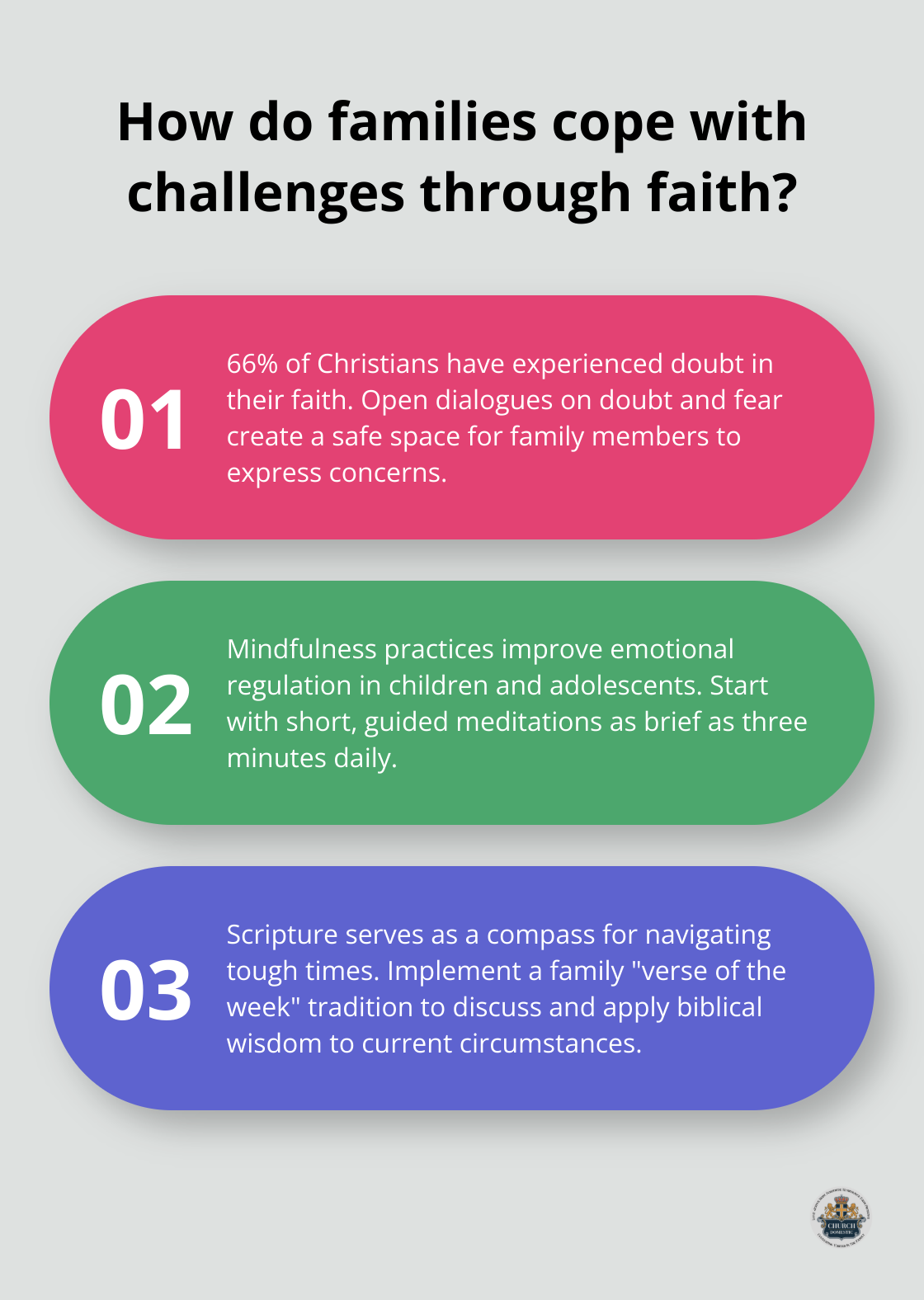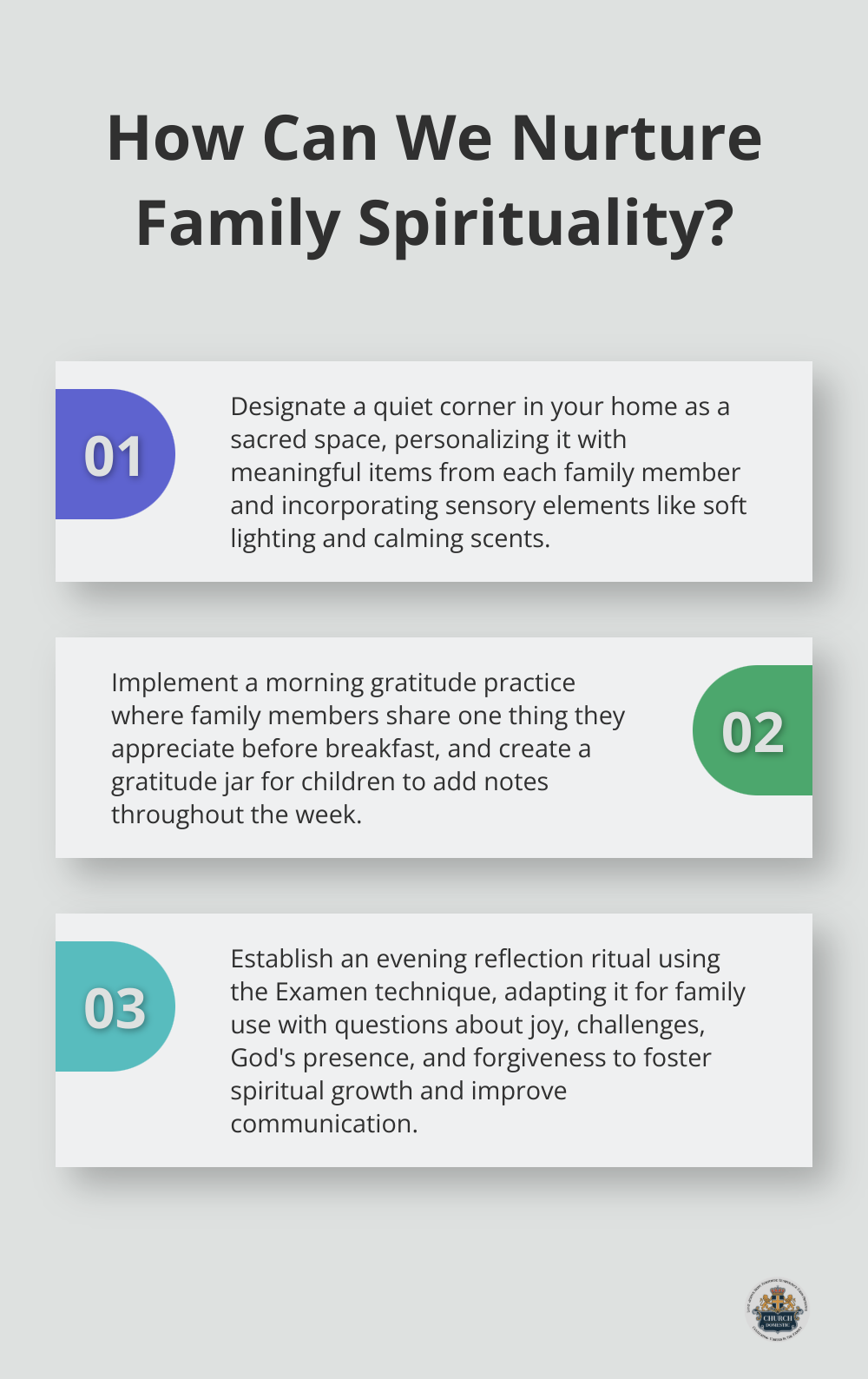In today’s fast-paced world, finding spiritual balance can seem like an impossible task for many families. At Church Domestic, we understand the challenges of maintaining spiritual wellness amidst life’s chaos.
This guide offers practical strategies to help your family create a harmonious spiritual environment at home. From establishing sacred spaces to incorporating daily rituals, we’ll explore ways to navigate life’s ups and downs with faith as your compass.
How to Create a Sacred Space at Home
Creating a sacred space at home empowers your family to foster spiritual growth and balance. This dedicated area serves as a sanctuary for reflection, prayer, and connection with the divine.
Choose the Right Location
The first step in creating a sacred space requires selecting an appropriate location. Find a quiet corner of your home that’s free from distractions. This could be a spare room, a nook in your bedroom, or even a secluded spot in your garden. Select a place where family members can retreat for moments of solitude and spiritual practice.
Personalize Your Sacred Space
Once you’ve chosen the location, it’s time to personalize your sacred space. This is where you can get creative and involve the whole family. Ask each family member to contribute something meaningful to the space. Include items like family photos, spiritual statues, meaningful quotes, or personal mementos that inspire and comfort you.

Consider incorporating elements from nature, such as plants or stones, which can help ground the space and connect it to the natural world.
Don’t overlook the importance of comfort. Add soft cushions, blankets, or a comfortable chair to make the space inviting for extended periods of reflection or prayer.
Create a Sensory Experience
Engage all the senses to enhance the spiritual atmosphere of your sacred space. Soft lighting, such as candles or salt lamps, can create a warm and peaceful ambiance. Essential oils or incense can provide calming scents that aid in relaxation and focus.
Try adding a small water feature, like a tabletop fountain. The sound of flowing water can contribute to a peaceful atmosphere.
Music can also play a crucial role in setting the mood for spiritual practice. Create a playlist of calming instrumental music or sacred chants that resonate with your family’s beliefs.
Maintain the Sacred Space
Keeping your sacred space clean and organized is essential for maintaining its spiritual energy. Establish a routine for tidying and refreshing the area. This could be a weekly family activity where everyone participates in cleaning and rearranging the space as needed.
Encourage family members to respect the sacred space by removing shoes before entering or speaking in hushed tones. This helps to reinforce the special nature of the area and creates a clear distinction from the rest of the home.
A sacred space is not static. Allow it to evolve with your family’s spiritual journey. Regularly update the elements in the space to reflect new insights, experiences, or seasons in your family’s life.
With a thoughtful and personalized sacred space in your home, you provide your family with a physical anchor for spiritual practices. This dedicated area becomes a powerful tool for finding peace amidst the chaos of daily life, offering a consistent place for reflection, prayer, and connection with the divine. As we move forward, let’s explore how to incorporate daily rituals that can further enhance your family’s spiritual connection within this sacred space.
Daily Rituals for Spiritual Growth
Establishing daily rituals can significantly enhance your family’s spiritual connection. These practices, when integrated into your routine, create a rhythm that anchors your family in faith amidst life’s chaos. Let’s explore some practical ways to incorporate spiritual rituals into your daily life.
Morning Gratitude Practice
Start each day with gratitude. This simple yet powerful practice sets a positive tone for the day. Ask family members to share one thing they appreciate before breakfast. For younger children, create a gratitude jar where they can add notes throughout the week, reading them together on weekends.
Gratitude is strongly and consistently associated with greater happiness. It helps people feel more positive emotions, relish good experiences, and improve their overall well-being. A morning gratitude ritual nurtures spiritual growth and promotes overall well-being.
Meaningful Mealtime Moments
Mealtimes provide a natural opportunity for spiritual connection. Take a moment for a family prayer or blessing before eating. Keep it simple – even a brief “thank you” suffices. The key lies in consistency and sincerity.

Use this time to engage in meaningful conversations. Discuss a Bible verse or share how you’ve witnessed God’s work that day. For families with teens, rotate who leads the mealtime prayer or discussion, allowing everyone to contribute.
Evening Reflection and Reconciliation
Conclude your day with a time of reflection and forgiveness. This practice clears the air of any tensions and reinforces the importance of reconciliation in your family’s spiritual life.
Try the Examen, a technique of prayerful reflection on the day’s events. It seeks to examine your thoughts, words, and actions, especially using the Ignatian lessons on the discernment of spirits. Adapt it for family use with questions like:
- What brought you joy today?
- Where did you face challenges?
- How did you notice God’s presence?
- Do you need to forgive someone or ask for forgiveness?
This practice fosters spiritual growth and improves communication and emotional intelligence within the family.
Implementing Sustainable Habits
Start small when introducing these rituals (perhaps with just one practice) and gradually build up. The goal is to create sustainable habits that enrich your family’s spiritual life, not to add stress or obligation.
Consistency matters more than perfection. Some days will flow smoothly, while others might feel chaotic. The power lies in returning to these practices day after day, allowing them to shape your family’s spiritual journey over time.
As we explore ways to nurture spiritual growth through daily rituals, it’s essential to consider how these practices can support us during life’s inevitable challenges. In the next section, we’ll discuss strategies for navigating difficult times with faith as your guide.
Facing Adversity Through Faith
Life’s challenges test even the strongest families. When difficulties arise, faith provides comfort, guidance, and strength. Many families weather storms by anchoring themselves in spiritual practices.
Scripture as a Compass
The Bible offers wisdom for navigating tough times. Many families find solace in specific verses that speak to their situation. Powerful Bible verses can help encourage you to overcome life’s struggles.

To make scripture a practical tool, try a family “verse of the week” tradition. Choose a relevant passage and display it prominently in your home. Discuss its meaning and how it applies to your current circumstances during family meals or devotional times.
Mindfulness and Meditation for Families
Mindfulness and meditation in your family routine can reduce stress and anxiety during challenging periods. A study published in the Journal of Child and Family Studies found that mindfulness practices improved emotional regulation in children and adolescents.
Start with short, guided meditations suitable for all ages. Many apps offer family-friendly sessions as short as three minutes. Begin with just a few minutes daily, then increase the duration as your family becomes more comfortable with the practice.
Open Dialogues on Doubt and Fear
A safe space for family members to express doubts and fears is important for spiritual growth and emotional well-being. A survey by the Barna Group revealed that 66% of Christians have experienced doubt in their faith at some point.
Encourage open conversations by sharing your own experiences with doubt or fear. This vulnerability can help children and teens feel more comfortable expressing their concerns. Set aside regular “family check-in” times where everyone can share what’s on their mind without judgment.
When addressing doubts, avoid dismissive responses. Instead, use these moments as opportunities for deeper exploration of faith. If you don’t have all the answers, that’s okay. Admit uncertainty and commit to seeking answers together (this can strengthen family bonds and individual faith).
Practical Faith Exercises
Try practical exercises to strengthen faith during difficult times. One effective method involves keeping a “God Sighting” journal. Encourage family members to write down moments where they noticed God’s presence or intervention in their daily lives (no matter how small).
Another helpful practice is the “Gratitude Challenge.” Each day, challenge family members to find three things they’re grateful for, even in the midst of hardship. This exercise shifts focus from problems to blessings, fostering a more positive outlook.
Community Support
Don’t underestimate the power of community support during tough times. Engage with your church family, join support groups, or connect with other families facing similar challenges. Sharing experiences and praying together can provide comfort and perspective.
Final Thoughts
Maintaining spiritual wellness is a journey that requires patience and dedication. The strategies we’ve discussed form a solid foundation for nurturing spiritual balance within your family. Small, daily practices often yield more significant results than sporadic, grand gestures. Personalize these practices to fit your family’s unique needs and preferences.

At Church Domestic, we understand the importance of spiritual wellness in family life. Our blog offers resources to support you on your journey towards a more balanced and fulfilling family life. We provide guidance and inspiration as you navigate the joys and challenges of nurturing your family’s spiritual growth.
The path to spiritual balance is ongoing (embrace the process, celebrate small victories, and don’t be discouraged by setbacks). With patience, persistence, and faith, you can create a home environment that fosters peace, connection, and spiritual growth for every family member. Your efforts will contribute to a spiritually balanced home, yielding rewards that are well worth the investment.